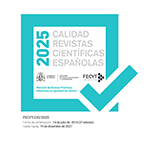Gender, Ideology and Conceptual Metaphors: Women and the Source Domain of the Hunt
Abstract
As a cognitive process, metaphorical reasoning is inevitable, but not necessarily innocent or neutral. It is well known that the conceptual domains of love and sex have received substantial attention within cognitive linguistics. However, a source domain that merits further exploration from a gender ideology perspective is that of the hunt. For this reason, following an approach that links cognitive linguistics with critical discourse analysis this article examines the conceptualisation of love, seduction and the search for a partner/husband through hunting metaphors, focusing on the discursive representation of women and the hunt. In the texts studied the conceptual metaphors love/seduction/the search for a partner or husband is a hunt are activated through metaphorical linguistic expressions with terms such as hunt, chase, pursue, catch, capture, trap etc. Regarding ideology, metaphors are powerful transmitters of folk beliefs and dominant conceptions of femininity and masculinity. Gender values that show man as the privileged sex as well as sexist ideologies supportive of male dominance and female submissiveness have been found to underlie the texts under consideration.
Downloads
Article download
License
In order to support the global exchange of knowledge, the journal Complutense Journal of English Studies is allowing unrestricted access to its content as from its publication in this electronic edition, and as such it is an open-access journal. The originals published in this journal are the property of the Complutense University of Madrid and any reproduction thereof in full or in part must cite the source. All content is distributed under a Creative Commons Attribution 4.0 use and distribution licence (CC BY 4.0). This circumstance must be expressly stated in these terms where necessary. You can view the summary and the complete legal text of the licence.









